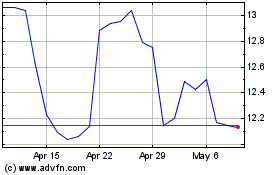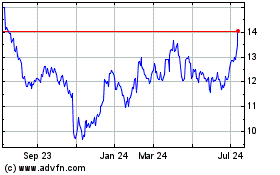Volkswagen Pact Helps Ford in Europe
July 12 2019 - 5:22PM
Dow Jones News
By Mike Colias
Ford Motor Co.'s expanded alliance with Volkswagen AG will give
the U.S. auto maker an important corporate ally in Europe, where
tougher emissions rules are raising costs significantly for the
auto industry.
The two global car-manufacturing giants agreed Friday to jointly
develop an electric car for the European market, using VW's
existing technology for battery-powered vehicles. Ford said it
would build about 100,000 vehicles a year with VW's electric-car
tool kit, starting in 2023.
Separately, VW also will invest $2.6 billion in Ford's
self-driving car partner, Argo AI, valuing the Pittsburgh-based
startup at $7 billion. Argo will work with both car companies to
develop self-driving technology that each can use once they roll
out autonomous vehicles in a few years.
Car manufacturers are rushing to bring hundreds of new hybrid
and battery-electric cars to market in Europe by next year to meet
the continent's new targets on greenhouse-gas emissions, which
sharply limit tailpipe pollutants. Analysts say a number of car
companies are already at risk of failing to meet the targets and
could face hefty fines.
In working with VW, Ford hopes it can develop an electric car
for Europe faster and at a lower cost than it could on its own.
"Given the upcoming European regulation shifts, this should help
Ford avoid emission fines," said Colin Langan, an auto analyst for
UBS Group AG.
Auto makers are pouring billions into electric-car development,
even though most executives and analysts say they lose money on
each one sold. The technology isn't cheap enough to sell at
mass-market prices, largely because of the high battery costs.
Producing an electric car costs $12,000 more than making a
comparable gasoline vehicle, and parity is likely still five years
off, according to consulting firm McKinsey & Co.
Europe has proved challenging for Ford, which last month laid
out plans to close factories on the continent and cut 12,000 jobs
-- or more than 20% of its European workforce. The U.S. auto maker,
which has struggled to maintain profitability in Europe over the
years, also is reducing its manufacturing footprint in the region
to 18 plants from 24 by year's end.
For VW, the expanded alliance coincides with the German
company's recent heavy investments in electric vehicles. Last fall
the Wolfsburg-based auto maker said it would earmark roughly $50
billion over the coming five years for electric cars, autonomous
vehicles and digital services.
On Friday, VW Chief Executive Officer Herbert Diess said
offering its electric-car technology to Ford would increase
adoption of electric vehicles world-wide and give his company added
scale.
VW is facing its own troubles. Earlier this year, the auto maker
said it would cut 7,000 jobs to trim costs as it focuses on the
electric-vehicle market. VW and some of its executives are also
facing legal challenges from the U.S. Securities and Exchange
Commission as well as German authorities stemming from its 2015
diesel-emissions scandal.
The Ford-VW partnership on electric and autonomous vehicles
builds on an alliance struck earlier this year between the two car
companies to collaborate on commercial vans and trucks.
--Sara Germano contributed to this article.
Write to Mike Colias at Mike.Colias@wsj.com
(END) Dow Jones Newswires
July 12, 2019 17:07 ET (21:07 GMT)
Copyright (c) 2019 Dow Jones & Company, Inc.
Ford Motor (NYSE:F)
Historical Stock Chart
From Mar 2024 to Apr 2024

Ford Motor (NYSE:F)
Historical Stock Chart
From Apr 2023 to Apr 2024
